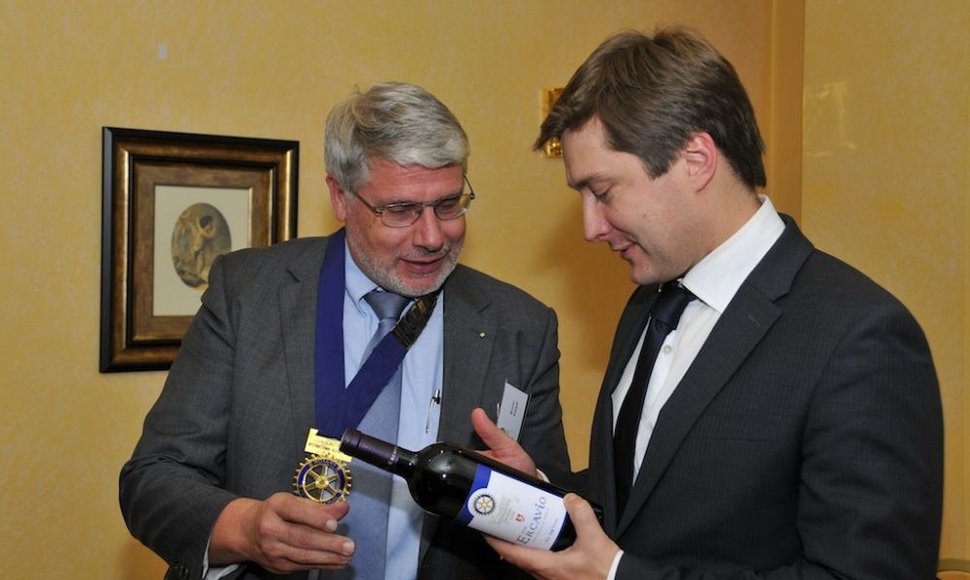While in fact, Rotary International is an international network of clubs of... successful men (and women) who come together regularly to further their world-wide (and sometimes more local) agenda. Currently, the agenda includes eradicating polio and providing Lithuanian hospitals with tuberculosis diagnostics equipment.
“The club's aim has a strong humanitarian element,” says Bruno Kaspar, president of Vilnius International Rotary Club. “Those who join Rotary are usually people in reasonably successful positions. Rotary provides the possibility to give something back to the society.”
Strict standards
Rolling back a little, the first Rotary Club was established in 1905 in Chicago, by four business acquaintances. “And the original intention was to improve ethical standards in professional life,” Mr Kaspar says. “So Rotary has certain standards on ethical behaviour in business. Theoretically, you should be reasonably sure that when dealing with a Rotarian, you are dealing with an honest person.”
 |
| Vilnius International Rotary Club nuotr./Rotary summer camp 2011 |
It is for a reason that such a club should form in Chicago, hometown of the American mafia at the time. Rotary Clubs were later set up in other US cities and spread all over the world and currently make up an international network of over 34 thousand clubs. There are 43 Rotary Clubs in Lithuania alone, one of which was set up by Mr Kaspar and several of his friends in Vilnius nine years ago.
The distinctive feature of this particular club is that it is intended for Lithuania's international professional community. “There was no international club in Lithuania at the time, so we thought of making it possible for foreigners to join: ambassadors, top managing people at foreign companies, etc.”
And join they did. Currently, Vilnius International Rotary Club has 45 members. The most recent addition to the company – the ambassador of the Kingdom of Sweden. The club is also open to Lithuanians who now make up two thirds of its membership. “But the target is to have half and half,” says Kaspar, who is honorary consul-general of Switzerland and has been moving between Vilnius, Riga, and Tallinn for the last eleven years.
Besides philanthropy and business ethics, networking is the third reason why people join the Rotarians, he says. Aha, so they do indeed do it to further their careers?
“I don't think that, in Lithuania, it helps,” Mr Karpar admits. “I know that in Switzerland, if you join an old established Zurich club, it can at least help further your career. But here, other mechanisms are at work.”
No more lawyers
Even so, Rotarians are an exclusive club that not everyone can join. “Admission is by invitation only,” Mr Kaspar says. A candidate must be endorsed by an existing member and then he or she is voted on. Each member has a veto – so a new Rotarian must have one hundred percent approval of existing members.
Moreover, if a member decides to use the veto, he or she does not have to give any explanation. “Nose too big or
 |
| Vilnius International Rotary Club nuotr./Rotary Bookshelf 5 |
whatever.” Usually, though, it is doubts over candidate's professional ethics that might prevent his or her entry. Mr Kaspar remembers at least 8 cases of vetoed memberships to the club.
In addition to the 100-percent-approval requirement, there is also a certain quota for representatives of each professional area – so that members could strike up more varied conversations in club meetings. “We have now fixed a rule in our club that we will not take more than 5 people from the same job classification,” he says. “I think we are filled up with lawyers.”
Rotarians then meet up on a weekly basis, for lunch, to discuss club's projects or listen to presentations. In one of the recent Tuesday lunches, Rotarians were listening to a report by a young Lithuanian student whom the club sent on a three-month exchange to Australia. “I'm not sure, though, if it's a good program or a bad one,” Mr Kaspar laughs, “because it seems that two or three people who went there are now thinking of moving to Australia.”
Humanitarian agenda
On the whole, each Rotary Club can be involved in projects on three levels. The most basic projects are ones developed and executed by separate clubs themselves. Each year, Vilnius International takes kids from socially difficult families on a week-long summer camp. Not only does the club organize the camp, but its members also take part and interact with children. “We don't think we should only finance it, you should also dedicate your own personal time,” Mr Kaspar thinks.
The second level is what in the Rotary jargon is referred to as “Matching Grant.” A club – in cooperation with several others – can put together a project and if it matches certain criteria, the Rotary Foundation, the central headquarters based in the US, doubles the money. In this way, Vilnius Rotarians have provided vehicles for a project called “Meals on Wheels,” delivering free food to elderly or sick people in need of assistance.
 |
| Vilnius International Rotary Club nuotr./2011 Rotary & Interact christmas presents |
The highest-level projects are put together, administered, and financed internationally, with local clubs serving as executors. “There is one project that we are involved in now, together with two other clubs, which is fighting tuberculosis in Lithuania.” Rotarians have made available over 2 hundred thousand US dollars for the purchase of tuberculosis diagnostics equipment for hospitals in Vilnius, Kaunas, and Klaipėda.
“Then there is an overall project of the Rotary which is the eradication of polio,” Mr Kaspar says. The effort is directed from the US central office and since the disease mostly affects third-world countries, Lithuanian Rotarians are not directly involved in it.
Funding for the project comes from members' contributions. Mr Kaspar's club charges 800 litas (230 euros) a year. More than half of it goes either to the Rotary Foundation in the US, or the Rotary Committee in Lithuania. “Yes, there's even a Rotary committee in Lithuania,” Mr Kaspar laughs about an intricate structure of the enterprise.
Plus, there is an initiation fee for new members – a rather suggestive sum of 777 litas. “I don't even know what symbol is behind it,” Vilnius International Rotary Club president says. Or he just wouldn't tell – perhaps Rotarians are like freemasons after all.












